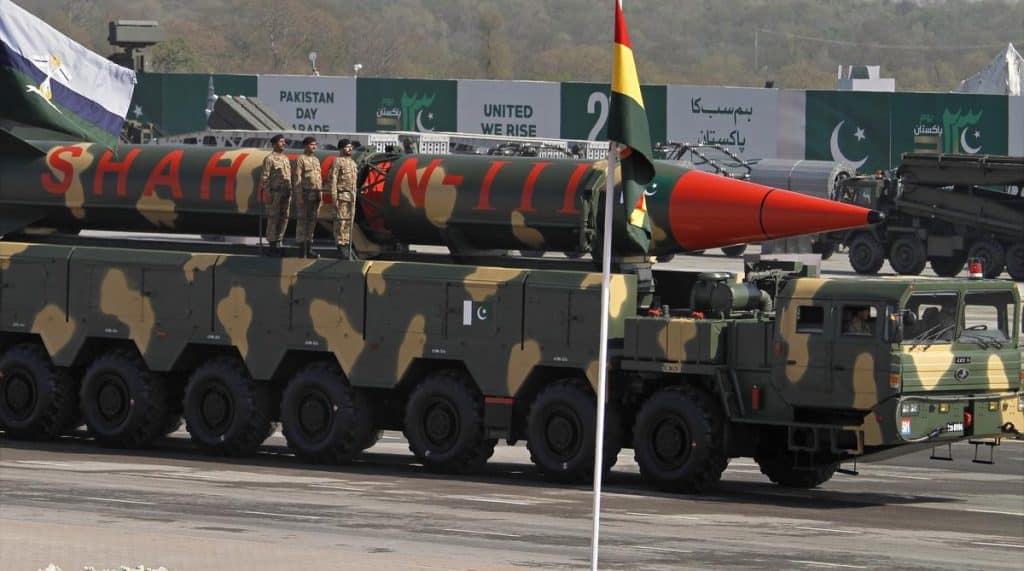Pakistan developing missiles that eventually could hit US
WASHINGTON: A senior White House official on Thursday said nuclear-armed Pakistan is developing long-range ballistic missile capabilities that eventually could allow it to strike targets outside of South Asia, including the United States.
Deputy national security adviser Jon Finer said Islamabad’s conduct raised “real questions” about its intentions.
White House official : Pakistan developing missiles that eventually could hit US “Candidly, it’s hard for us to see Pakistan’s actions as anything other than an emerging threat to the United States,” Finer said in a speech to the Carnegie Endowment for International Peace.
The latest statement comes only a day after the US State Department said it was imposing additional sanctions related to Pakistan’s ballistic missile programme, targeting four entities that it said were contributing to the proliferation or delivery of such weapons.
The statement, issued on the State Department’s website, said that the decision was taken “in light of the continuing proliferation threat of Pakistan’s long-range missile development”.
It added that the four entities were being designated for sanctions pursuant to Executive Order (EO) 13382, which targeted proliferators of weapons of mass destruction and their means of delivery.
“Pakistan’s National Development Complex – which is responsible for Pakistan’s ballistic missile program and has worked to acquire items to advance Pakistan’s long range ballistic missile program – and Affiliates International, Akhtar and Sons Private Limited, and Rockside Enterprise – which have worked to supply equipment and missile‐applicable items to Pakistan’s ballistic missile program, including its long range missile program – are being designated pursuant to E.O. 13382 Section 1(a)(ii) for having engaged, or attempted to engage, in activities or transactions that have materially contributed to, or pose a risk of materially contributing to, the proliferation of weapons of mass destruction or their means of delivery (including missiles capable of delivering such weapons), including any efforts to manufacture, acquire, possess, develop, transport, transfer, or use such items, by Pakistan,” read the statement.
However, Islamabad reacted strongly to the development, terming the the decision as “biased” and stressing that the step from the US has “dangerous implications for strategic stability of our region and beyond”.
“Pakistan’s strategic capabilities are meant to defend its sovereignty and preserve peace and stability in South Asia. The latest installment of sanctions defies the objective of peace and security by aiming to accentuate military asymmetries. Such policies have dangerous implications for strategic stability of our region and beyond,” Foreign Office spokesperson Mumtaz Zahra Baloch said in a statement.
The Foreign Office stressed that the county’s strategic programme is a sacred trust bestowed by 240 million people upon its leadership, adding that the sanctity of this trust, held in the highest esteem across the entire political spectrum, cannot be compromised.
In September this year, Washington targeted five entities and one individual with sanctions, which were involved in the expansion of ballistic missiles and controlling missile equipment and technology to Pakistan.
Department spokesperson Matthew Miller alleged that the Beijing Research Institute of Automation for Machine Building Industry had worked with Pakistan to procure equipment for testing rocket motors for the Shaheen-3 and Ababeel systems and potentially for larger systems.
However, Pakistan categorically dismissed “unilateral” US sanctions on technology companies allegedly linked to the country’s ballistic missile programme, calling them “unfair, unfounded, and uncalled-for”.
“Pakistan considers this action as biased and politically-motivated. Similar listings of commercial entities in the past were based on mere suspicion; involved items not listed under any export control regime and yet were considered sensitive under broad, catch-all provisions,” said Mumtaz Zahra Baloch, Spokesperson for the Ministry of Foreign Affairs (Mofa) had said.
Similarly, the US — in October 2023 — imposed sanctions on three Chinese companies for supplying missile-applicable items to Pakistan.
The sanctions also affected China-based firms Hubei Huachangda Intelligent Equipment Co, Universal Enterprise, and Xi’an Longde Technology Development Co. Pakistan-based Innovative Equipment and a Chinese national were sanctioned for knowingly transferring equipment under missile technology restrictions.

